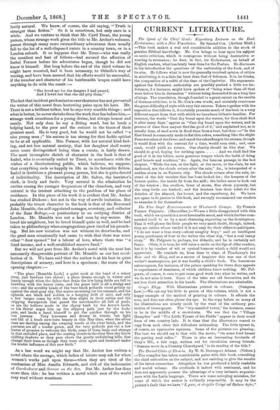CURRENT LITERATURE.
The Quest of the Chief Good : Expository Lectures on the Boo47 Ecclesiastes ; with a New Translation. By Samuel Cox. (Arthur Miall.) —This book makes a real and considerable addition to the stock of genuine Biblical knowledge. Mr. Cox brings to bear upon his sttbject an acute criticism, which is courageous without being destructive or wanting in reverence ; he does, in fact, for Ecclesiastes, on behalf of English readers, what has lately been done for the Psalms. He discusses in his introduction the questions of the authorship of the book, and of its aim. Ho follows what is now the generally received opinion of critics in attributing it to a date far later than that of Solomon. It is, he thinks, the composition of a rabbi of the time of the Captivity. His arguments against the Solomonio authorship aro possibly pushed a little too far. Solomon, for instance, might have spoken of" being wiser than all that were before him in Jerusalem" without being descended from a long line of kings. The translation, though founded to a great extent on the results of German criticism, is in Mr. Cox's own words, and certainly overcomes the great difficulty of style with very fair success. Taken together with the exposition that follows it, it certainly presents much of the book in a very different aspect from that with which we have been hitherto familiar. For instance, the words "Cast thy bread upon the waters, for thou shalt find it after many days," appear as "Cast thy bread upon the waters, and in process of time thou mayest find the good of it," and explained not, as is usually done, of seed sown in flood-time from a boat, but thus :—" In the East broad is commonly made in flat thin cakes, something like the slight Passover cakes of theJews ; and one of the cakes flung lathe stream, though it would float with the current for a time, would soon sink; and, once sunk, would yield no return. Our charity should ho like that. We should do good, hoping for nothing again And we shall find the good of it in the loftier, more generous temper which the habit of doing good breeds and confirms," etc. Again, the famous passage. in the last chapter, "While the sun, or the light, or the moon, or the stars, be not darkened, nor the clouds return after the rain," &c., is interpreted of a sudden storm in an Eastern city. The clouds return after the rain, in- stead of the fair weather that has been looked for ; the keepers of the houses quake; the maids fly from the mill ; the ladies cease to look out of the window ; the swallow, lover of storm, flies about joyously, but the song-birds are hushed ; and the feasters lose their relish for the dainties of the almond, the locust, and the caperberry, dm. We have not space to do justice to this book, and strongly recommend our readers to examine it for themselves.


































 Previous page
Previous page